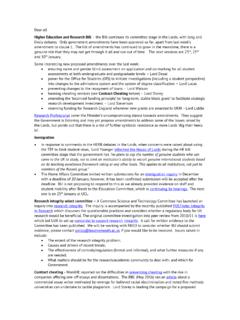Transcription of FINANCIAL REGULATIONS PREAMBLE
1 FINANCIAL REGULATIONS . PREAMBLE . These REGULATIONS are made by the Director of Finance, acting on the advice of the Management Board, under powers conferred by the Council under paragraph 5 of Ordinance C1. They are subordinate to, and should be read in conjunction with the College s Statutes and Ordinances and in particular with Ordinance C1 : FINANCIAL Matters. Terms defined in the Charter, Statutes and Ordinances bear the same meaning in these FINANCIAL REGULATIONS , unless the context requires otherwise. These REGULATIONS apply only to College, as defined in paragraph 7c of Ordinance C1. It is the responsibility of Heads of Department to ensure that their staff are made aware of the existence and content of these REGULATIONS . RESPONSIBILITIES FOR FINANCIAL MANAGEMENT. The Management Board The key responsibilities of the Management Board are to set and review the College s high- level strategy and priorities, and to allocate resources for College activities.
2 It also ensures the delivery of College strategy, ensures that resources are deployed effectively, and holds Budget Holders to account for delivery of their plans and budgets. The Board also considers and approves major projects and delegates this responsibility when appropriate. Its terms of reference are: a) To set overall strategy, priorities and total budgets for the College;. b) To ensure delivery of the Strategic Plan;. c) To ensure that resources are deployed effectively;. d) To hold the Planning Units ( , faculties, operations and others) to account for delivery of their plans and budgets;. e) To approve and track major projects and to assign responsibility for these when appropriate;. f) To ensure that effective management and legal compliance structures are in place within College;. g) To ensure effective internal and external communication of College activities.
3 H) To develop and nurture relationships which will enhance the reputation, image and funding of the College;. i) To respond to major external opportunities and threats;. j) To receive reports and recommendations from each of its subcommittees;. k) To frame recommendations requiring Council approval;. l) To review its terms of reference and membership annually. The members of the Management Board are appointed by the Rector. The Portfolio Review Board The Portfolio Review Board, answerable to the Management Board, approves, monitors and prioritises all College projects, including the capital programme. For this purpose, a project is defined as any scheme relating to the built estate or major equipment ( physical infrastructure ), information and communications technology ( technology and information systems ), ways of organising and performing core business ( business processes ) or complex programmes with a range of significant impacts on the College s infrastructure or operations ( complex programmes ).
4 1. Senior College Officers The Rector is the College s designated officer for the purposes of the HEFCE memorandum. As such, he is ultimately responsible for all aspects of the FINANCIAL administration of the College s affairs. In this capacity, he must advise the Council if, at any time, any action or policy under consideration by them appears to him to be incompatible with the FINANCIAL memorandum. If the Council decides nevertheless to proceed, he must immediately inform the chief executive of the HEFCE in writing. The Rector must ensure that annual estimates of income and expenditure are prepared for consideration by the Council and for the management of budgets and resources within the estimates approved by Council. As the designated officer, the Rector may be required to justify any of the institution s FINANCIAL matters to the Public Accounts Committee at the House of Commons (or equivalent bodies in Scotland and Wales).
5 The Rector s responsibilities are summarised in Ordinance D2. The Chief Operating Officer is the head of support services of the University and is responsible to the Rector. The Director of Finance is responsible for the organisation and control of the central Finance Division, for day-to-day operational management of the University s FINANCIAL activities and resources, and for provision of FINANCIAL information for management and planning purposes. He is also responsible for publishing FINANCIAL procedures, as required in order to fulfil obligations under these FINANCIAL REGULATIONS . Functions required under this Ordinance to be performed by the Director of Finance may, in his absence, be fulfilled by the Chief Operating Officer, the College Secretary or such other College Officer as the Rector may from time to time determine.
6 Officers of the University are listed in Ordinance D3. FINANCIAL responsibilities are delegated to them by the Rector, including those set out in appendix 1. Faculties, divisions, departments, etc. The academic and administrative organisation of the College into faculties, divisions, departments, centres and units is determined by the Rector. Changes to the organisational structure and the appointment of senior officers are announced by College Notice. FINANCIAL MANAGEMENT AND CONTROL. FINANCIAL Planning The Director of Finance is responsible for preparing annually a FINANCIAL plan for approval by the Council on the recommendation of the Rector, and for preparing FINANCIAL forecasts for submission to HEFCE. Resource allocation FINANCIAL resources are allocated annually on the recommendation of the Rector. The Director of Finance is responsible for preparing each year an annual budget and capital programme for consideration by the Management Board.
7 The budget process will allocate FINANCIAL resources to individual areas of the College as agreed by Management Board. Budget Holders are responsible for the economic, effective and efficient use of resources allocated to them. During the year, the Director of Finance is responsible for submitting revised budgets to the Management Board for approval, as required. 2. Budgetary control The control of income and expenditure within an agreed budget is the responsibility of the designated Budget Holder, supported by the relevant finance manager, who must ensure that day-to- day monitoring is undertaken effectively. Budget Holders are responsible to their immediate superior for the income and expenditure appropriate to their budget. Significant departures from agreed budgetary targets must be reported immediately to the Director of Finance by the Head of Department concerned and, if necessary, corrective action taken.
8 The Finance Director shall maintain records of all Budget Holders and their budget allocation. It is the responsibility of all Budget Holders to notify the Director of Finance of any changes required to budgetary authorities within their control. FINANCIAL information Budget Holders are assisted in their duties by management information provided by the Director of Finance. The types of management information available to the different levels of management are described in FINANCIAL procedures, together with the timing at which they can be expected. The Director of Finance is responsible for supplying budgetary reports on all aspects of the College s finances to the Management Board on a basis determined by them, but subject to any specific requirements of the HEFCE. Treatment of year-end balances At the year end, Budget Holders will not normally have the authority to carry forward a balance on their budget to the following year unless the Management Board has approved a specific scheme for carrying forward all or part of unspent amounts.
9 Capital and projects : programme and approvals The capital programme includes all capital expenditure on land, buildings, equipment, furniture, fittings and associated costs whether or not they are funded from capital grants or from College resources. Related expenditure which is required in order to undertake a project, such as feasibility studies, planning costs, fees, removal costs, and any other directly-linked costs, must be included within the total project budget, regardless of whether such costs are capitalised in the College s accounts. The Director of Finance will establish protocols for the inclusion of capital projects in the capital programme. These will set out the information that is required for each proposed project as well as the FINANCIAL criteria that they are required to meet. FINANCIAL approval limits for projects are set out at serial 16 of appendix 1.
10 Proposals in respect of planned replacements, general improvement schemes, space planning or in response to requests from departments will normally be initiated by the Director of Estates Project Management or the Director of Facilities Management. Proposals for ICT developments will normally be initiated by the Director of ICT. Proposed capital projects should be supported by: a) A statement that demonstrates the project s consistency with the strategic plans and rationale for undertaking the project. b) A budget for the project for submission to the Portfolio Review Board. The budget should include a breakdown of costs including professional fees, VAT and funding sources. c) A FINANCIAL evaluation of the plans together with their impact on revenue, plus advice on the 3. impact of alternative plans. The Director of Finance will also establish procedures for the approval of variations, including the notification of large variations to the HEFCE, as laid down in HEFCE guidelines.














